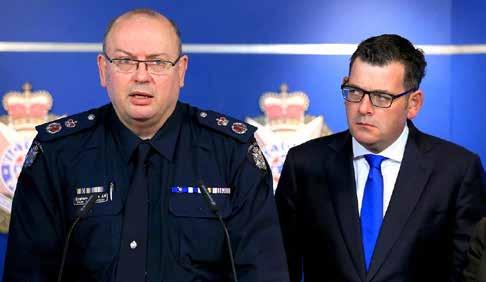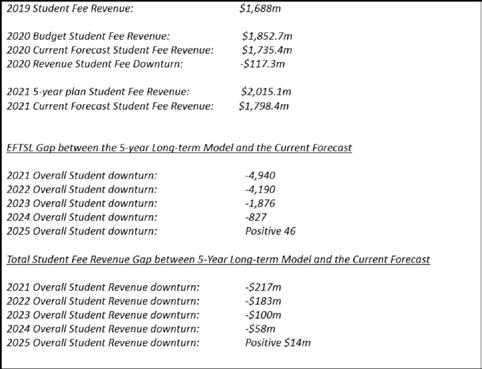ANALYSIS
Progressive pollie, pandemics and the police state Daanyal Saeed on why the Victorian ALP has embraced a punitive pandemic response. As COVID-19 case numbers continue to remain relatively low and controlled in New South Wales, we have begun to see a light at the end of the tunnel, and prepare ourselves for the way out from a generational health disaster. Throughout the pandemic, there has been a marked shift in our relationship to authority, and our relationship to police in a way that is distinct from any kind of response before, and which is deeply uncomfortable, particularly amongst the left. This is particularly disconcerting because the speed with which we have rushed to allow police to make and enforce public health matters is utterly incongruous with the reckoning with police that the rest of the Western world is currently undertaking. Osman Faruqi recently discussed our nation’s historical relationship to policing, noting that the “law and order auctions” of the 1990s
Victoria where the stage four lockdown has shone a white-hot spotlight on our relationship to authority, turning traditional political understandings on their head. The enforcement of the lockdown in Victoria has been justified by a line of attack from both the Government and its agencies that blamed particularly young people and ethnic minorities for “not following the rules”, sowing the seeds of discontent and division in the community that preceded harsher crackdowns on protesters and individuals. The flashpoint for this in the wider community was the preemptive arrest of Ballarat anti-lockdown protestor Zoe-Lee Buhler, a video of which was viewed over 7.5 million times and drew immense sympathy not just to the broader anti-lockdown cause but to conspiracy theorists arguing that
It is difficult to trace the basis of the law and order fixation in Victorian politics, but the modern state of place is rooted in then-Opposition Leader Ted Ballieu’s declaration that “no civil society will tolerate being eaten from within by the cancer of sickening violence” in New South Wales took advantage of a concept called “penal populism”: the basis of the political strategy of being tough on crime. In essence, we eat it up — it gives legitimacy and validation to the visceral feelings of anger we have, particularly when we see crimes of particular seriousness in the public eye, crimes committed by a minority we don’t like, or otherwise significant unfairness. No more transparently has this been seen than in Victoria, where a second wave took hold of the state’s population, ravaging its aged care homes and its precarious workforces. The phenomenon of public health or COVID-compliance being categorised as a police matter is almost entirely unique to Australia, and Australian penalties for non-compliance are some of the harshest in the world. But it is in
this is simply one element of “Dictator Dan’s” assault on civil liberties in order to execute his nefarious, corrupt plans for Victoria. The myth that the Victorian second wave stemmed from disparate ethnic families across the south-east and west of Melbourne having super-spreader iftars has been completely debunked by the ongoing hotel quarantine inquiry, showing that the primary factor above all else has been precarious labour conditions. Despite this, the line taken by the Andrews administration until very recently has been the idea of the general public not “following the rules”, providing space in the discourse for the otherwise generally impotent Victorian Opposition to stake claims that sociallydistanced protests such as the Black Lives Matter rallies were the source of the second wave, and providing a veil
Former Victorian Police Chief Commissioner Graham Ashton (left) and Dan Andrews (right). Photo: News Corp.
10
for the racism that their opposition is rooted in. Perpetuating a discourse in which working people are blamed for the spread of a virus that can be ultimately controlled by management has wider ranging implications beyond the Victorian border. Whilst no government wants to deal with the crisis that played out in Melbourne, it has been used to justify increasingly harsh police responses in NSW. This has built to a point where decentralised groups of less than 19 socially-distanced, masked students have been unduly and inappropriately targeted on campus for protesting fee hikes and course cuts last week. The 2018 Victorian state election was one in which the Victorian Liberals chose to run a negative law-and-order campaign centred around the twoheaded attack dog idea of the “African gang”; the (myth) that gangs of African youth, predominantly with South Sudanese backgrounds, were running around suburbs like Broadmeadows and Pakenham terrorising local communities. Whilst this was entirely based in falsehoods, innuendo and misrepresentation, the Andrews administration chose to “address it”. $2 billion. 3000 more cops. Two new prisons, including one youth prison. Fast-forward to 2020, and the Andrews Government is looking to push through a new bill, providing police with the power to make preemptive COVIDbased arrests, despite the Victorian 14day case average dipping below 40 at the time of writing, the lowest point in the last three months. With such a consistent pro-cop disposition, the question of why the supposed most progressive state in Australia continues to vote for policy like that propagated by Andrews needs to be interrogated; the 2018 state election didn’t occur in a vacuum, and it paved the way for what we see today. It is difficult to trace the basis of the law-and-order fixation in Victorian politics, but the modern state of play is identified by Gay Alcorn as being rooted in then-Opposition Leader Ted Ballieu’s declaration that “no civil society should tolerate being eaten from within by the cancer of sickening violence”. He won the following election on a similarly reductive approach to crime and harm minimisation, putting thousands of armed guards at train stations. This has gone hand in hand with stricter bail laws and mandatory minimum sentences, taking Victoria from a relatively innovative state in the justice space to one of the harshest, most punitive jurisdictions in the country. Nonetheless, the idea that the ALP need to “get tough” and shake off a conception of being soft lefties is not one necessarily rooted in nuanced political strategy, nor in progressive principle. Before the pandemic even started, we saw moves from the Palaszczuk administration in Queensland to specifically target environmental and human rights activists, based on claims such as boobytrapping that weren’t substantiated by
evidence, as well as more generalised crackdowns on bail laws in March, particularly targeting youth. In a regular political environment, the penally populist approach is typically a winner in a nation of cops with a majority of white voters who simply are less affected by police violence. However, this is not a regular political environment; we have begun to see the breadth of police violence and scope of their creeping attacks on civil liberties begin to affect classes and demographics it hasn’t before, or at least not to this extent, and there is a groundswell of public anger at white people being treated how the rest of us have been all along. Andrews’ approval rating has plummeted from 75% back in June to 49% in August, despite ongoing strong support for many of the draconian measures imposed under stage four restrictions. This suggests a dichotomy between voters’ understanding of the impacts of giving such powers to police and the figures who enact them. Politically, this is dangerous territory for the Andrews administration, and it along with other state governments, would do well to learn from the political impacts of aggressively pursuing increasingly punitive enforcement policy towards the back end of a pandemic. We know voters have short memories, but it would take a monumental effort from Andrews to drag himself into another term in 2022 given the extent to which the federal mismanagement of the pandemic has been conflated with his own leadership. Whilst he may be saved by the seemingly endless incompetence of the Victorian Opposition, who have called him a dictator from the rooftops as they simultaneously call for the army to take over, lost their own rigged Facebook polls, and called for the mass culling of Australian fruit bats to eradicate coronavirus, there still remain political consequences for the punitive, harsh and excessively draconian measures being pursued by the Andrews administration, many of which are at odds with his clean-shaven image as Australia’s most progressive Premier. If we want to walk out of the other side of this without anti-protest laws that permanently suffocate our nation’s democracy, and police powers that torment and scar the bodies of minorities around the country, then we ought to interrogate our “progressive” politicians far more robustly and with far more nuance than we have. It’s not about water drops in Twitter handles, or #StandingWithDan. It’s about recognising that conservatives are hell-bent on using the pandemic to tear us apart; next week the Morrison Government will plunge 2.2 million people into poverty, and Gladys Berejiklian has backed in a police force that will shut down protests seemingly at will and with little regard for public health. In order to counter that, our “progressive” politicians need to do a lot better, and it doesn’t come from #StandingWithThem, it comes from holding them to account.








